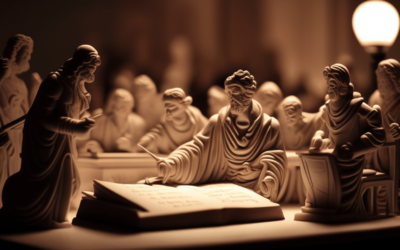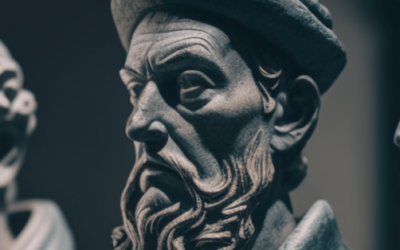- Athenagoras (133-190)
- Arthenogoras says it is unlawful to partake of the flesh of men. “But what need is there to speak of bodies not allotted to be the food of any animal, and destined only for a burial in the earth in honour of nature, since the Maker of the world has not alloted any animal whatsoever as food to those of the same kind, although some others of a different kind serve for food according to nature? If, indeed, they are able to show that the flesh of men was alloted to men for food, there will be nothing to hinder its being according to nature that they should eat one another, just like anything else that is allowed by nature, and nothing to prohibit those who dare to say such things from regaling themselves with the bodies of their dearest friends as delicacies, as being especially suited to them, and to entertain their living friends with the same fare. But if it be unlawful even to speak of this, and if for men to partake of the flesh of men is a thing most hateful and abominable, and more detestable than any other unlawful and unnatural food or act; and if what is against nature can never pass into nourishment for the limbs and parts requiring it, and what does not pass into nourishment can never become united with that which it is not adapted to nourish,–then can the bodies of men never combine with bodies like themselves, to which this nourishment would be against nature, even though it were to pass many times through their stomach, owing to some most bitter mischance” (Athenagoras, On the Resurrection of the Dead, 8)
- Augustine (354-430)
- Augustine says the elements are a resemblance of the actual body and blood. “Was not Christ once for all offered up in His own person as a sacrifice? and yet, is He not likewise offered up in the sacrament as a sacrifice, not only in the special solemnities of Easter, but also daily among our congregations; so that the man who, being questioned, answers that He is offered as a sacrifice in that ordinance, declares what is strictly true? For if sacraments had not some points of real resemblance to the things of which they are the sacraments, they would not be sacraments at all. In most cases, moreover, they do in virtue of this likeness bear the names of the realities which they resemble. As, therefore, in a certain manner the sacrament of Christ’s body is Christ’s body, and the sacrament of Christ’s blood is Christ’s blood,’ in the same manner the sacrament of faith is faith.” (Augustine, Letter 98:9)
- Augustine said regarding John 6:63 says Christ said not to eat the body or blood which you see, referring to Christ saying to the disciples. “But He instructed them, and saith unto them, ‘It is the Spirit that quickeneth, but the flesh profiteth nothing; the words that I have spoken unto you, they are spirit, and they are life.’ Understand spiritually what I have said; ye are not to eat this body which ye see; nor to drink that blood which they who will crucify Me shall pour forth.” (Augustine, Expositions on the Psalms, 99:8)
- Augustine says Christ’s words in John 6 about his body and blood are figurative. “If the sentence is one of command, either forbidding a crime or vice, or enjoining an act of prudence or benevolence, it is not figurative. If, however, it seems to enjoin a crime or vice, or to forbid an act of prudence or benevolence, it is figurative. ‘Except ye eat the flesh of the Son of man,’ says Christ, ‘and drink His blood, ye have no life in you.’ This seems to enjoin a crime or a vice; it is therefore a figure, enjoining that we should have a share in the sufferings of our Lord, and that we should retain a sweet and profitable memory of the fact that His flesh was wounded and crucified for us.” (Augustine, On Christian Doctrine, 3:16:24)
- Clement of Alexandria (150-215)
- Clement of Alexandria says the communion wine is called wine. “In what manner do you think the Lord drank when He became man for our sakes? As shamelessly as we? Was it not with decorum and propriety? Was it not deliberately? For rest assured, He Himself also partook of wine; for He, too, was man. And He blessed the wine, saying, ‘Take, drink: this is my blood’ – the blood of the vine. He figuratively calls the Word ‘shed for many, for the remission of sins’ – the holy stream of gladness. And that he who drinks ought to observe moderation, He clearly showed by what He taught at feasts. For He did not teach affected by wine. And that it was wine which was the thing blessed, He showed again, when He said to His disciples, ‘I will not drink of the fruit of this vine, till I drink it with you in the kingdom of my Father.’” (Clement of Alexandria, The Instructor, 2:2)
- Clement of Alexandria said the bread and wine were symbols, metaphor. “Elsewhere the Lord, in the Gospel according to John, brought this out by symbols, when He said: ‘Eat ye my flesh, and drink my blood,’ describing distinctly by metaphor the drinkable properties of faith and the promise, by means of which the Church, like a human being consisting of many members, is refreshed and grows, is welded together and compacted of both, – of faith, which is the body, and of hope, which is the soul; as also the Lord of flesh and blood. For in reality the blood of faith is hope, in which faith is held as by a vital principle.” (Clement of Alexandria, The Instructor, 1:6)
- Cyril of Jerusalem (313-386)
- “Christ on a certain occasion discoursing with the Jews said, Except ye eat My flesh and drink My blood, ye have no life in you. They not having heard His saying in a spiritual sense were offended, and went back, supposing that He was inviting them to eat flesh.” (Cyril of Jerusalem, Gregory Nazianzen The Catechetical Lectures of S. Cyril. On the Mysteries. IV: On the Body and Blood of Christ. catholiccrossreference.com/fathers/index.php/John%206:53)
- Eusebius (263-339)
- Eusebius says the Communion is ‘only the bread and wine,’ “And the fulfilment of the oracle is truly wondrous, to one who recognizes how our Saviour Jesus the Christ of God even now performs through His ministers even today sacrifices after the manner of Melchizedek’s. For just as he, who was priest of the Gentiles, is not represented as offering outward sacrifices, but as blessing Abraham only with wine and bread, in exactly the same way our Lord and Saviour Himself first, and then all His priests among all nations, perform the spiritual sacrifice according to the customs of the Church, and with wine and bread darkly express the mysteries of His Body and saving Blood.” (Eusebius, Demonstratio Evangelica, 5:3)
- Eusebius says the bread and wine are symbol’s of Christ’s Body. “The words, ‘His eyes are cheerful from wine, and his teeth white as milk,’ again I think secretly reveal the mysteries of the new Covenant of our Saviour. ‘His eyes are cheerful from wine,’ seems to me to shew the gladness of the mystic wine which He gave to His disciples, when He said, ‘Take, drink; this is my blood that is shed for you for the remission of sins: this do in remembrance of me.’ And, ‘His teeth are white as milk,’ shew the brightness and purity of the sacramental food. For again, He gave Himself the symbols of His divine dispensation to His disciples, when He bade them make the likeness of His own Body. For since He no more was to take pleasure in bloody sacrifices, or those ordained by Moses in the slaughter of animals of various kinds, and was to give them bread to use as the symbol of His Body, He taught the purity and brightness of such food by saying, ‘And his teeth are white as milk.’ This also another prophet has recorded, where he says, ‘Sacrifice and offering hast thou not required, but a body hast thou prepared for me.'” (Eusebius, Demonstratio Evangelica, 8:1)
- Origen (185-254)
- Origin says the Bread is bread. He says nothing of a spiritual change. “Now, if ‘everything that entereth into the mouth goes into the belly and is cast out into the drought,’ even the meat which has been sanctified through the word of God and prayer, in accordance with the fact that it is material, goes into the belly and is cast out into the draught, but in respect of the prayer which comes upon it, according to the proportion of the faith, becomes a benefit and is a means of clear vision to the mind which looks to that which is beneficial, and it is not the material of the bread but the word which is said over it which is of advantage to him who eats it not unworthily of the Lord. And these things indeed are said of the typical and symbolical body. But many things might be said about the Word Himself who became flesh, and true meat of which he that eateth shall assuredly live for ever, no worthless person being able to eat it; for if it were possible for one who continues worthless to eat of Him who became flesh, who was the Word and the living bread, it would not have been written, that ‘every one who eats of this bread shall live for ever.'” (Origen, On Matthew, 11:14)
- Tertullian (155-220)
- Tertullian says the communion bread represents Christ’s body. “Indeed, up to the present time, he has not disdained the water which the Creator made wherewith he washes his people; nor the oil with which he anoints them; nor that union of honey and milk wherewithal he gives them the nourishment of children; nor the bread by which he represents his own proper body, thus requiring in his very sacraments the ‘beggarly elements’ of the Creator.” (Tertullian, Against Marcion, 1:14)
- Tertullian refers to the communion supper as spiritual words. “He says, it is true, that ‘the flesh profiteth nothing;’ but then, as in the former case, the meaning must be regulated by the subject which is spoken of. Now, because they thought His discourse was harsh and intolerable, supposing that He had really and literally enjoined on them to eat his flesh, He, with the view of ordering the state of salvation as a spiritual thing, set out with the principle, ‘It is the spirit that quickeneth;’ and then added, ‘The flesh profiteth nothing,’ – meaning, of course, to the giving of life. He also goes on to explain what He would have us to understand by spirit: ‘The words that I speak unto you, they are spirit, and they are life.’ In a like sense He had previously said: ‘He that heareth my words, and believeth on Him that sent me, hath everlasting life, and shall not come into condemnation, but shall pass from death unto life.’ Constituting, therefore, His word as the life-giving principle, because that word is spirit and life, He likewise called His flesh by the same appelation; because, too, the Word had become flesh, we ought therefore to desire Him in order that we may have life, and to devour Him with the ear, and to ruminate on Him with the understanding, and to digest Him by faith. Now, just before the passage in hand, He had declared His flesh to be ‘the bread which cometh down from heaven,’ impressing on His hearers constantly under the figure of necessary food the memory of their forefathers, who had preferred the bread and flesh of Egypt to their divine calling.”–(Tertullian, On the Resurrection of the Flesh, 37)
- Theodoret (393-457)
- Theodoret says the elements remain as bread and wine. “For even after the consecration the mystic symbols [of the eucharist] are not deprived of their own nature; they remain in their former substance figure and form; they are visible and tangible as they were before.” (Theodoret, Dialogues, 2)
- “…and of His body He says “The bread that I will give is my flesh which I will give for the life of the world,” and when He delivered the divine mysteries and broke the symbol and distributed it…” (Theodoret, Jerome and Gennadius, Rufinus and Jerome The Ecclesiastical History, Dialogues, and Letters of Theodoret. Letters of the Blessed Theodoret, Bishop of Cyprus. To the Monks of Constantinople. http://www.catholiccrossreference.com/fathers/index.php/John%206:54)
- Theophilus of Antioch (d. 185?)
- Theophilis of Antioch denies that Christians eat human flesh. “Nor indeed was there any necessity for my refuting these, except that I see you still in dubiety about the word of the truth. For though yourself prudent, you endure fools gladly. Otherwise you would not have been moved by senseless men to yield yourself to empty words, and to give credit to the prevalent rumor wherewith godless lips falsely accuse us, who are worshippers of God, and are called Christians, alleging that the wives of us all are held in common and made promiscuous use of; and that we even commit incest with our own sisters, and, what is most impious and barbarous of all, that we eat human flesh.” (Theophilus to Autolycus, 3:4)
Examples of bad interpretations of Scripture by various Church Fathers
The Church Fathers did a great job of expounding on Scripture. They clarified, defined, and refuted. We owe a debt to...






